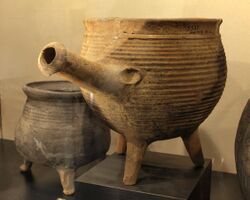Engineering:Pipkin

A pipkin is an earthenware cooking pot used for cooking over direct heat from coals or a wood fire. They were not held in direct flame which would crack the ceramic. It has a handle and many (though not all) examples had three feet. Late medieval and post-medieval pipkins had a hollow handle into which a stick might be inserted for manipulation. Examples exist unglazed, fully glazed, and glazed only on the interior.
While often spheroidal, they were made with straight outwardly-sloping sides.[1] They were occasionally made with lids or pouring spouts.
Heraldry
The pipkin, also called a three-legged pot (marmite (fr.), Grapen (ger.)), is sometimes used as a charge in heraldry. It is especially common in arms in Brandenburg, Pomerania and East Prussia.
It is used in the canting arms for the German families von Grape,[2] Grapengießer and Grappendorf, and Groppe von Gudenberg.
-
Estorf (Landkreis Stade)
-
Gehlenbeck
-
Samtgemeinde Wathlingen
-
Wathlingen
See also
References
- ↑ "Pipkin, Place of origin: England (made) Hampshire (possibly, made) Date: ca. 1500-1600 (made)". Victoria & Albert Museum, London. https://collections.vam.ac.uk/item/O148552/pipkin-unknown/. Retrieved 19 February 2017.
- ↑ Gert Oswald: Lexikon der Heraldik. VEB Bibliographisches Institut, Leipzig 1984.
External links
 |




